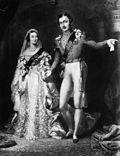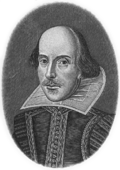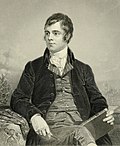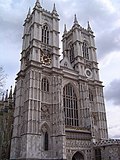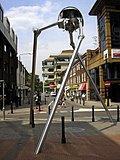
Back بوابة:المملكة المتحدة Arabic Portal:Böyük Britaniya Azerbaijani প্রবেশদ্বার:যুক্তরাজ্য Bengali/Bangla دەروازە:شانشینی یەکگرتوو CKB Portál:Spojené království Czech Portal:Vereinigtes Königreich German Portal:Qraliya Yewbiyayiye DIQ Portal:Reino Unido Spanish درگاه:بریتانیا Persian Portail:Royaume-Uni French
The United Kingdom Portal
 |
 |
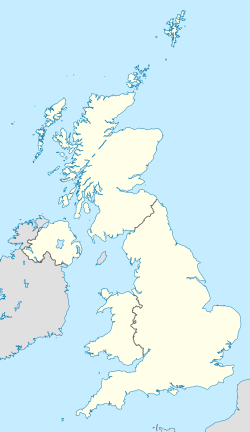
| |
The United Kingdom of Great Britain and Northern Ireland, commonly known as the United Kingdom (UK) or Britain, is a country in Northwestern Europe, off the coast of the continental mainland. It comprises England, Scotland, Wales and Northern Ireland. The UK includes the island of Great Britain, the north-eastern part of the island of Ireland, and most of the smaller islands within the British Isles, covering 94,354 square miles (244,376 km2). Northern Ireland shares a land border with the Republic of Ireland; otherwise, the UK is surrounded by the Atlantic Ocean, the North Sea, the English Channel, the Celtic Sea and the Irish Sea. It maintains sovereignty over the British Overseas Territories, which are located across various oceans and seas globally. The UK had an estimated population of over 68.2 million people in 2023. The capital and largest city of both England and the UK is London. The cities of Edinburgh, Cardiff and Belfast are the national capitals of Scotland, Wales and Northern Ireland.
The UK has been inhabited continuously since the Neolithic. In AD 43 the Roman conquest of Britain began; the Roman departure was followed by Anglo-Saxon settlement. In 1066 the Normans conquered England. With the end of the Wars of the Roses the Kingdom of England stabilised and began to grow in power, resulting by the 16th century in the annexation of Wales and the establishment of the British Empire. Over the course of the 17th century the role of the British monarchy was reduced, particularly as a result of the English Civil War. In 1707 the Kingdom of England and the Kingdom of Scotland united under the Treaty of Union to create the Kingdom of Great Britain. In the Georgian era the office of prime minister became established. The Acts of Union 1800 incorporated the Kingdom of Ireland to create the United Kingdom of Great Britain and Ireland in 1801. Most of Ireland seceded from the UK in 1922 as the Irish Free State, and the Royal and Parliamentary Titles Act 1927 created the present United Kingdom.
The UK became the first industrialised country and was the world's foremost power for the majority of the 19th and early 20th centuries, particularly during the Pax Britannica between 1815 and 1914. The British Empire was the leading economic power for most of the 19th century, a position supported by its agricultural prosperity, its role as a dominant trading nation, a massive industrial capacity, significant technological achievements, and the rise of 19th-century London as the world's principal financial centre. At its height in the 1920s the empire encompassed almost a quarter of the world's landmass and population, and was the largest empire in history. However, its involvement in the First World War and the Second World War damaged Britain's economic power, and a global wave of decolonisation led to the independence of most British colonies. (Full article...)
Featured article
The production of renewable energy in Scotland is an issue that has come to the fore in technical, economic and political terms during the opening years of the 21st century. The natural resource base for renewables is extraordinary by European, and even global standards. In addition to an existing installed capacity of 1.3 gigawatts (GW) of hydro-electric schemes, Scotland has an estimated potential of 36.5 GW of wind and 7.5 GW of tidal power, 25% of the estimated total capacity for the European Union and up to 14 GW of wave power potential, 10% of EU capacity. The renewable electricity generating capacity may be 60 GW or more, considerably greater than the existing capacity from all fuel sources of 10.3 GW. Much of this potential remains untapped, but continuing improvements in engineering are enabling more of the renewable resource to be utilised. Fears regarding 'peak oil' and climate change have driven the subject high up the political agenda and are also encouraging the use of various biofuels. Although the finances of many projects remain either speculative or dependent on subsidies, it is probable that there has been a significant, and in all likelihood long-term, change in the underpinning economics. (Full article...)
Featured biography
Robert Baden-Powell was a lieutenant-general in the British Army, writer, and founder of the Scout Movement. After having been educated at Charterhouse School, Baden-Powell served in the British Army from 1876 until 1910 in India and Africa. In 1899, during the Second Boer War in South Africa, Baden-Powell successfully defended the city in the Siege of Mafeking. Several of his military books, written for military reconnaissance and scout training in his African years, were also read by boys. Based on those earlier books, he wrote Scouting for Boys, published in 1908 by Pearson, for youth readership. During writing, he tested his ideas through a camping trip on Brownsea Island that began on August 1, 1907, which is now seen as the beginning of Scouting. After his marriage with Olave St Clair Soames, Baden-Powell, his sister Agnes Baden-Powell and notably his wife actively gave guidance to the Scouting Movement and the Girl Guides Movement. Baden-Powell lived his last years in Nyeri, Kenya, where he died in 1941. (Full article...)
General images -
Subportals
WikiProjects
Things you can do
- Visit the British Wikipedians' notice board.
- The noticeboard is the central forum for information and discussion on editing related to the United Kingdom.
- Comment at the British deletion sorting page.
- This page lists deletion discussions on topics relating to the United Kingdom.
Featured pictures
Did you know -

- ... that Ruth Northway is the United Kingdom's first professor of learning disability nursing?
- ... that despite being an independent candidate, Leanne Mohamad came within 528 votes of defeating shadow health secretary Wes Streeting in the 2024 UK general election?
- ... that the Labour Party received their highest share of the vote to date in the 1951 UK general election but still lost to the Conservatives, who received fewer votes?
- ... that in 1943, Bhicoo Batlivala led a group of Indian women to the House of Commons to request the release of Gandhi from prison?
- ... that "one of the finest cut brick façades" in the United Kingdom has been partially obscured by scaffolding for four years, as funds are raised for its repair?
- ... that, before same-sex unions were legally recognised in the UK, the London Partnership Register allowed nearly 1,000 couples to celebrate their relationships?
In the news
- 20 June 2025 – Middle Eastern crisis
- Iranian foreign minister Abbas Araghchi meets with the foreign ministers of the United Kingdom, Germany, France and European Union in Geneva for talks about its nuclear program. (AP)
- 20 June 2025 –
- The United Kingdom parliament votes to approve a bill allowing terminally ill adults to voluntarily end their lives, moving towards legalizing assisted suicide in England and Wales. (DW) (BBC News)
- 10 June 2025 – Fossil fuel phase-out
- The British government announces it will invest £14.2 billion (US$19 billion) to construct the new Sizewell C nuclear power station in Suffolk, England, to reduce the country's reliance on fossil fuels. (AP) (Reuters)
- 10 June 2025 – War crimes in the Gaza war, Gaza humanitarian crisis
- The United Kingdom, Canada, Australia, New Zealand, and Norway impose sanctions on Israeli far-right ministers Bezalel Smotrich and Itamar Ben-Gvir, including asset freezes and travel bans, due to their conduct during the Gaza war. (Reuters)
- 9 June 2025 – Israeli blockade of the Gaza Strip
- The Israeli Navy seizes the June 2025 Gaza Freedom Flotilla's flagship vessel, the United Kingdom-flagged Madleen, and takes its occupants (including Swedish activist Greta Thunberg and MEP Rima Hassan) to Israel. The humanitarian aid the ship was carrying en route to Gaza will still be sent into Gaza. (The Times of Israel)(CNN) (The Guardian)
- 1 June 2025 –
- A ban on the sale of disposable vapes enters force in the United Kingdom. (BBC News)
Categories
Other UK-connected Wikipedias
Wikimedia
The following Wikimedia Foundation sister projects provide more on this subject:
-
Commons
Free media repository -
Wikibooks
Free textbooks and manuals -
Wikidata
Free knowledge base -
Wikinews
Free-content news -
Wikiquote
Collection of quotations -
Wikisource
Free-content library -
Wikiversity
Free learning tools -
Wikivoyage
Free travel guide -
Wiktionary
Dictionary and thesaurus

















